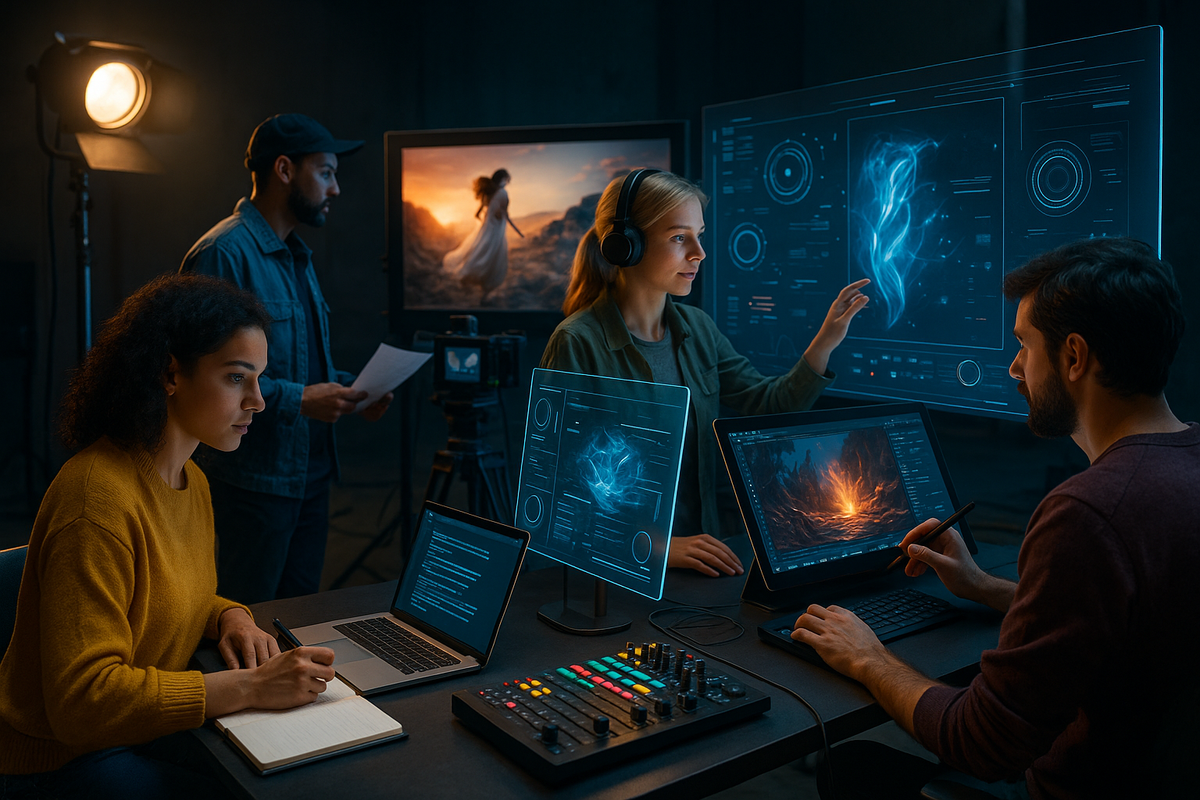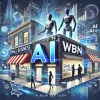
By Chris Sturges | WBN News Global | WBN News Langley | June 2, 2025
Artificial Intelligence (AI) is no longer just a futuristic plot device—it’s now a co-writer, editor, production assistant, and even marketer in the modern film industry. While many fear that AI could automate creative jobs out of existence, a closer look reveals a more complex—and hopeful—picture: AI is also creating entirely new career paths and reshaping existing ones in surprising ways.
As studios, indie filmmakers, and streaming giants adopt AI tools at a rapid pace, the need for skilled humans to guide, manage, and collaborate with these technologies is skyrocketing. From pre-production to post, marketing to ethics, the demand for hybrid professionals—those who understand both storytelling and tech—is redefining the future of film careers.
Lights, Camera, Algorithms: New Creative Roles
On the creative front, AI is opening new doors for artists and writers. Enter the AI Prompt Artist—a role unheard of just a few years ago. These specialists know how to “speak AI” and craft effective prompts that feed tools like Midjourney, Runway ML, or ChatGPT to produce concept art, visual scenes, or even story arcs. A poorly written prompt can yield generic outputs; a skillful one can conjure Oscar-worthy visuals.
Scriptwriters are also evolving into AI-assisted storytellers. Rather than fearing AI as competition, many writers now use tools to spark dialogue ideas, test alternate plot twists, or even simulate audience reactions before filming begins.
Meanwhile, Virtual Production Designers are merging traditional design with game engines like Unreal Engine, creating real-time, AI-augmented set designs that save time and money during production. And with performance capture becoming more accessible, the demand for MoCap Data Technicians and real-time integration specialists is climbing fast.
The Post-Production Revolution
The post-production suite is where AI might be making its biggest splash. Tools like Adobe Sensei, Topaz Video AI, and Descript are empowering a new generation of AI Video Editors who blend technical skill with creative judgment.
Gone are the days when only blockbuster studios could afford polished visual effects. With generative fill and motion prediction, small teams can now compete visually—so long as they have skilled editors who know how to coax quality from AI without over-relying on it.
Another emerging role is that of the Synthetic Media Manager—professionals who oversee the ethical creation and use of AI-generated voices, faces, or background extras. This role blends tech savvy with media ethics, copyright law, and deep creative intuition.
Similarly, Voice Clone Editors are in rising demand. These specialists work with AI-generated voiceovers, refining them to match a performer’s tone, emotional cadence, or linguistic nuances—especially for localization and dubbing.
Building the Behind-the-Scenes AI Infrastructure
Beyond the set and editing suite, a host of technical and managerial roles are coming to the forefront.
AI Workflow Consultants help productions integrate new tools smoothly into existing pipelines. Whether it’s real-time previsualization or automated tagging of footage, these experts ensure that creativity and productivity stay in sync.
Studios and streaming services are also hiring Custom AI Model Trainers, often machine learning engineers, to develop proprietary tools based on a company’s unique assets—think training an AI on a franchise’s visual aesthetic or dialogue style.
Given the ethical minefield surrounding synthetic content, there’s also rising demand for Ethical Compliance Officers with a focus on AI. These professionals review consent agreements, ensure compliance with likeness laws, and manage risk when using AI to recreate actors or generate deepfakes for storytelling.
AI in Marketing, Distribution, and Audience Engagement
Once the film is made, AI continues to shape the careers of those who bring it to the audience.
AI Marketing Strategists are using algorithms to cut personalized trailers, analyze viewer sentiment, and even optimize release timing. By understanding the data patterns behind what audiences watch and why, these professionals are driving smarter, more targeted campaigns.
Localization is also getting a reboot. AI Dubbing Supervisors and Translation QA Leads work alongside machine-generated outputs to ensure translations maintain cultural and emotional fidelity—vital in an increasingly globalized streaming economy.
Training for the Future
To keep up, training programs are emerging that bridge the creative-technical divide. AI Literacy Trainers are teaching filmmakers how to integrate AI without losing their artistic voice. Meanwhile, Creative-AI Collaboration Facilitators serve as liaisons between engineers and creatives to ensure the tools support the vision—not replace it.
The Final Frame
Far from replacing humans, AI in film is making space for new types of creativity, collaboration, and craftsmanship. The jobs of tomorrow will require not just storytelling skills or tech prowess—but the ability to blend both.
The winners in this new landscape will be those who embrace AI as a creative partner and see its potential not as a threat, but as a tool to expand what’s possible on screen.
Chris Sturges, Business Development Director for
Suspiciously Convenient Productions Inc
Contact: chris@suspiciouslyconvenient.com
#Future Of Film, #AI Creativity, #Film Industry Jobs, #Synthetic Cinema, #AI In Hollywood, #Creative Tech



